Introduction
Chronic pain is more than a long-lasting discomfort—it can affect almost every part of your life, including your heart health. Research shows that ongoing pain triggers stress hormones, disturbs sleep, reduces physical activity, and may even cause harmful changes in your blood vessels. All these factors increase your chances of developing high blood pressure (hypertension).
In India, millions struggle silently with back pain, arthritis, migraine, nerve pain, and muscle pain. Because the pain becomes “normal,” many do not realise how seriously it affects the internal systems that control blood pressure.
This blog explains in simple Indian-friendly language how chronic pain may dramatically raise your blood pressure, what early signs you must watch for, and when to see a doctor for timely treatment.
What Is Chronic Pain?
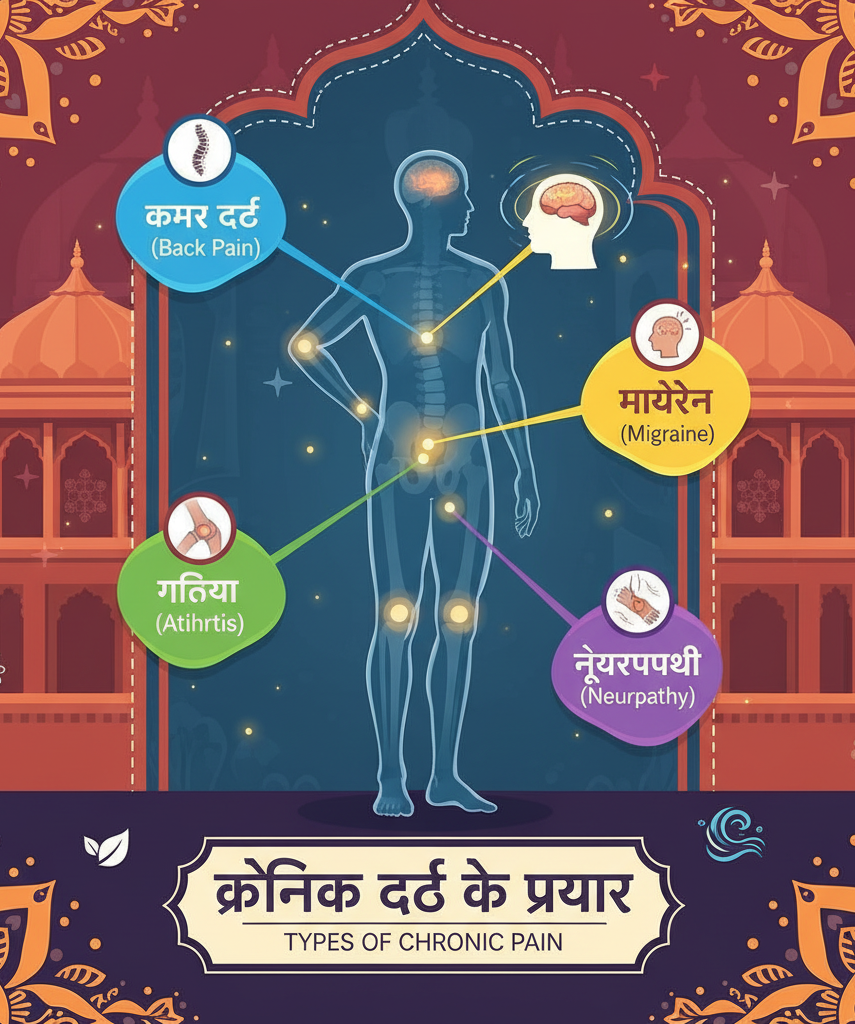
Chronic pain refers to pain that lasts longer than 3 months. Unlike pain from a fresh injury, chronic pain continues even after tissues heal.
Common types of chronic pain include:
-
Long-term back pain
-
Arthritis and joint pain
-
Migraine and headache
-
Neck and shoulder pain
-
Post-accident or post-surgical pain
-
Pelvic pain
-
Fibromyalgia
-
Cancer-related pain
How Chronic Pain Raises Blood Pressure
Chronic pain keeps the body under stress. This activates the “fight or flight” response again and again, which pushes your blood pressure higher.
Stress hormones stay elevated
Persistent pain releases adrenaline and cortisol. When these hormones remain high:
-
Blood vessels become narrow
-
Heart beats harder
-
Blood pressure increases
Poor sleep
Chronic pain disturbs sleep quality. Lack of proper sleep increases blood pressure, heart strain, and inflammation.
Reduced physical activity
Many people avoid movement due to pain. This leads to weight gain, lower stamina, and increased risk of hypertension.
Inflammation
Long-term inflammation affects blood vessels and circulation, worsening blood pressure.
Emotional stress
Living with pain causes anxiety, frustration, and depression—all of which increase BP.
Pain medicines
Long-term use of NSAIDs like diclofenac or ibuprofen may raise BP. Always take medicines as prescribed by a doctor.
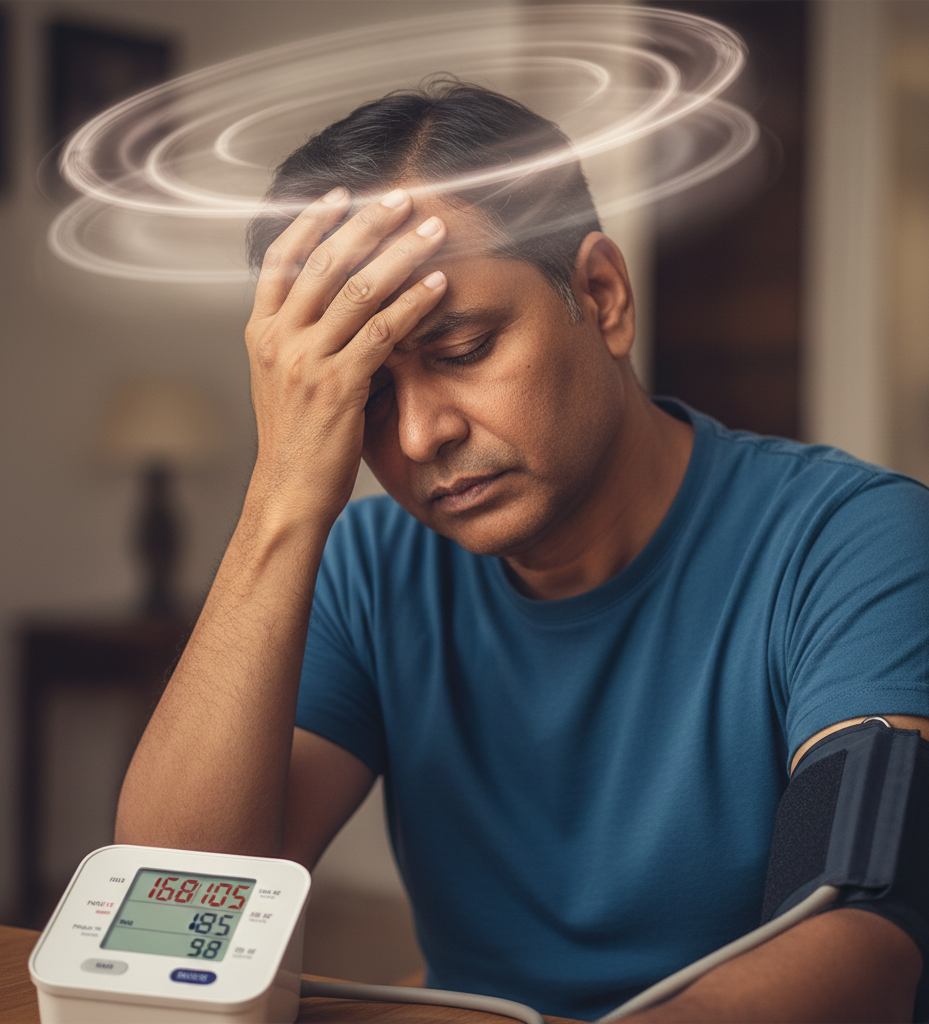
Symptoms of High Blood Pressure Linked to Chronic Pain
High blood pressure often has no symptoms, but some people may experience:
-
Headache
-
Dizziness
-
Chest discomfort
-
Rapid heartbeat
-
Blurred vision
-
Fatigue
-
Anxiety
-
Shortness of breath
If you notice these symptoms, consult a doctor through Quickobook for timely evaluation.
Diagnosis
Doctors may check for high blood pressure in patients with chronic pain through:
Blood pressure monitoring
-
Clinic readings
-
Home BP checks
-
24-hour ambulatory BP monitoring
ALSO READ: Why Young Adults Are Suddenly Developing High Blood Pressure: New Research Explained
Medical history
Your doctor will assess your pain duration, medications, daily routine, and stress levels.
Blood tests
To evaluate:
-
Cholesterol
-
Sugar
-
Thyroid levels
-
Kidney function
Heart evaluations
ECG or echocardiography if heart complications are suspected.
Treatment Options
Treatment focuses on managing both chronic pain and blood pressure together.
Pain management therapies
-
Physiotherapy
-
Heat or cold therapy
-
Yoga and stretching
-
Nerve stimulation therapies
-
Behavioral therapy
-
Meditation and breathing exercises
Medicines
Given under medical supervision:
-
Pain relief medicines
-
Anti-inflammatory drugs
-
Nerve pain medications
-
Muscle relaxants
-
BP-lowering medicines
Interventional treatment
For severe cases:
-
Trigger point injections
-
Nerve blocks
-
Epidural injections
-
Radiofrequency ablation
Lifestyle improvements
-
Regular movement or physiotherapy
-
Weight management
-
Balanced diet
-
Avoiding long sitting hours
-
Quitting smoking and alcohol
Lifestyle Changes to Protect Heart Health
A few daily habits can dramatically improve blood pressure and pain levels:
-
Eat more fruits, vegetables, whole grains
-
Reduce salt intake
-
Stay active through light walking or physiotherapy
-
Maintain a healthy weight
-
Practice meditation
-
Sleep 7–8 hours
-
Limit caffeine
-
Drink enough water
Prevention Tips
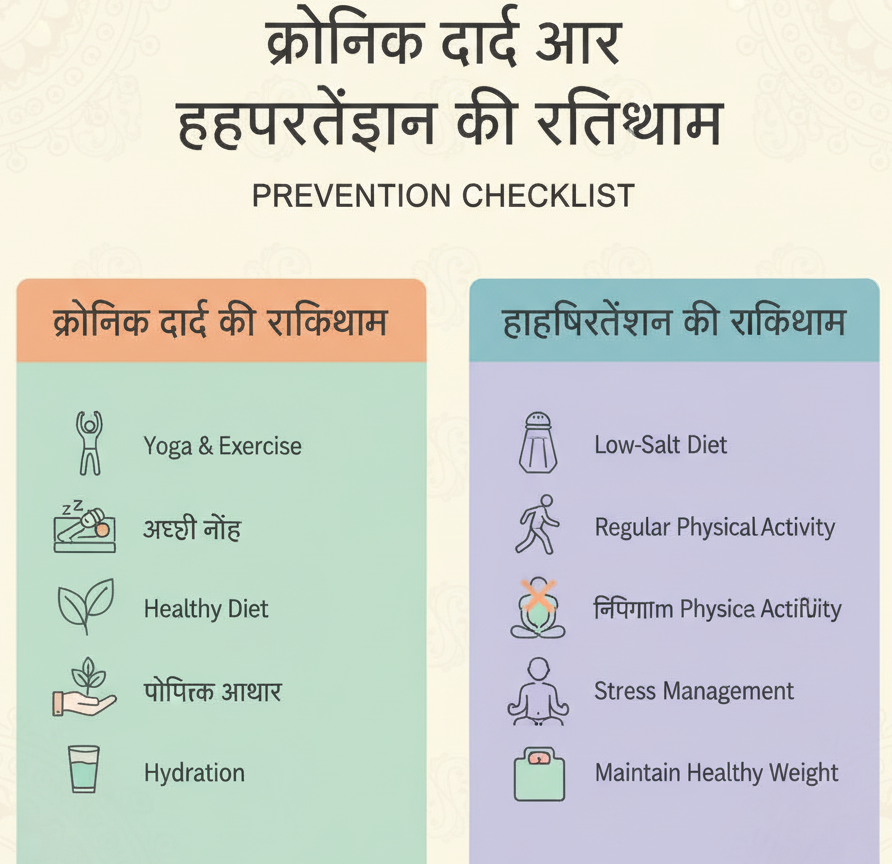
To prevent chronic pain from affecting your heart health:
-
Treat pain early
-
Avoid overuse of pain medicines
-
Follow ergonomic posture
-
Exercise regularly
-
Keep stress under control
-
Monitor BP regularly
-
Avoid tobacco and alcohol
When to See a Doctor
Seek medical help urgently if you experience:
-
Severe or worsening chronic pain
-
BP readings above 140/90 consistently
-
Chest pain
-
Shortness of breath
-
Dizziness or blackouts
-
Swelling in legs
-
Sudden severe headache
Quickobook helps you book pain specialists, cardiologists, orthopaedics, neurologists, and physiotherapists in your city instantly.
Risks & Complications
Ignoring chronic pain and high BP may lead to:
-
Heart attack
-
Stroke
-
Kidney damage
-
Nerve damage
-
Loss of mobility
-
Depression and anxiety
-
Reduced quality of life
Conclusion
Chronic pain may silently raise your blood pressure and weaken your heart health. Early diagnosis, proper treatment, stress control, and lifestyle changes can protect your heart and improve your daily comfort.
If you or someone you know struggles with long-term pain or high BP, consult a doctor through Quickobook for safe and guided management.
50 FAQs
-
Can chronic pain increase blood pressure?
Yes. Chronic pain triggers stress hormones that raise blood pressure. -
Does back pain affect blood pressure?
Yes, long-term back pain increases stress and can raise BP. -
Can arthritis cause high blood pressure?
Yes, inflammation and pain can contribute to hypertension. -
Can migraine increase BP?
During a migraine attack, BP may temporarily rise. -
Is high BP normal during pain episodes?
BP may rise temporarily but long-term rises need attention. -
Do painkillers cause high BP?
Some, like NSAIDs, may increase BP if used long-term. -
Does untreated pain harm the heart?
Yes, chronic pain puts long-term stress on the heart. -
Can nerve pain raise BP?
Yes, nerve pain triggers intense stress reactions. -
Does stress from pain increase BP?
Stress hormones from pain directly increase BP. -
Can lack of sleep from pain increase BP?
Yes, poor sleep is a major cause of hypertension. -
Does inflammation increase BP?
Chronic inflammation affects blood vessels and raises BP. -
Can chronic pain cause a heart attack?
It increases risk but is not a direct cause. -
Can BP rise during severe pain?
Yes, acute pain spikes BP immediately. -
Does chronic pain cause long-term hypertension?
Yes, repeated stress responses can lead to persistent high BP. -
Will BP lower if pain reduces?
Often yes, but depends on overall health. -
Is it safe to ignore chronic pain?
No. It affects heart, mood, sleep, and mobility. -
Can physiotherapy reduce BP?
Yes, by reducing pain and improving movement. -
Does yoga help chronic pain and BP?
Yes, yoga improves flexibility and lowers stress. -
Is walking good for chronic pain?
Yes, low-impact walking helps reduce pain and BP. -
Can weight gain from pain increase BP?
Yes, weight gain is a major hypertension risk. -
Should I monitor BP daily if I have chronic pain?
Yes, especially if symptoms worsen. -
Does chronic pain cause dizziness?
Pain itself may not, but high BP can. -
Can pain cause a fast heartbeat?
Yes, due to stress hormones. -
Do depression and pain increase BP?
Yes, emotional stress contributes to hypertension. -
Is chronic pain linked with heart disease?
Yes, directly and indirectly. -
Can diet help chronic pain and BP?
Yes, an anti-inflammatory diet improves both. -
Should I avoid salt if I have high BP?
Yes, reduce salt to protect heart health. -
Can massage therapy lower BP?
Yes, it relaxes muscles and reduces stress. -
Can meditation reduce BP?
Yes, it calms the nervous system. -
Do heat pads help high BP?
They help pain but not BP directly. -
Does drinking water reduce BP?
Hydration helps maintain BP balance. -
Can chronic pain affect kidneys?
Indirectly, through high BP. -
Are pain injections safe for BP patients?
Usually yes, but doctor supervision is required. -
Can nerve blocks lower BP?
They reduce pain, which lowers stress and BP. -
Can chronic pain cause breathing issues?
Pain may cause shallow breathing, adding stress. -
Does sitting long hours worsen pain and BP?
Yes, reduces circulation and increases stiffness. -
Can quitting smoking help BP and pain?
Yes, it improves heart and bone health. -
Does alcohol worsen chronic pain?
Yes, and it also increases BP. -
Can caffeine affect BP?
Yes, too much caffeine raises BP. -
Can high BP worsen pain?
It may increase muscle tension. -
Can chronic pain cause panic attacks?
Yes, intense pain triggers anxiety. -
Is long-term BP medicine safe?
Yes, when taken under medical supervision. -
Can cold weather increase pain and BP?
Yes, cold tightens muscles and blood vessels. -
Can vibration therapy reduce pain?
Yes, for some conditions. -
Is acupuncture good for chronic pain?
Many patients find relief with it. -
Can chronic pain reduce appetite?
Yes, affecting energy and mood. -
Can stress management lower BP?
Yes, it is one of the most effective ways. -
Is chronic pain lifelong?
Not always; many cases improve with treatment. -
Can heart patients take pain medicines?
Only those prescribed by a doctor. -
Should I see a doctor for mild chronic pain?
Yes, early diagnosis prevents complications.
Quickobook CTA
Need help managing chronic pain or high blood pressure?
Book appointments with top pain specialists, cardiologists, neurologists, orthopaedic doctors, and physiotherapists on Quickobook—fast, easy, and affordable.
Disclaimer
This blog is for educational purposes only and should not replace medical advice. Always consult a qualified doctor for diagnosis and treatment.
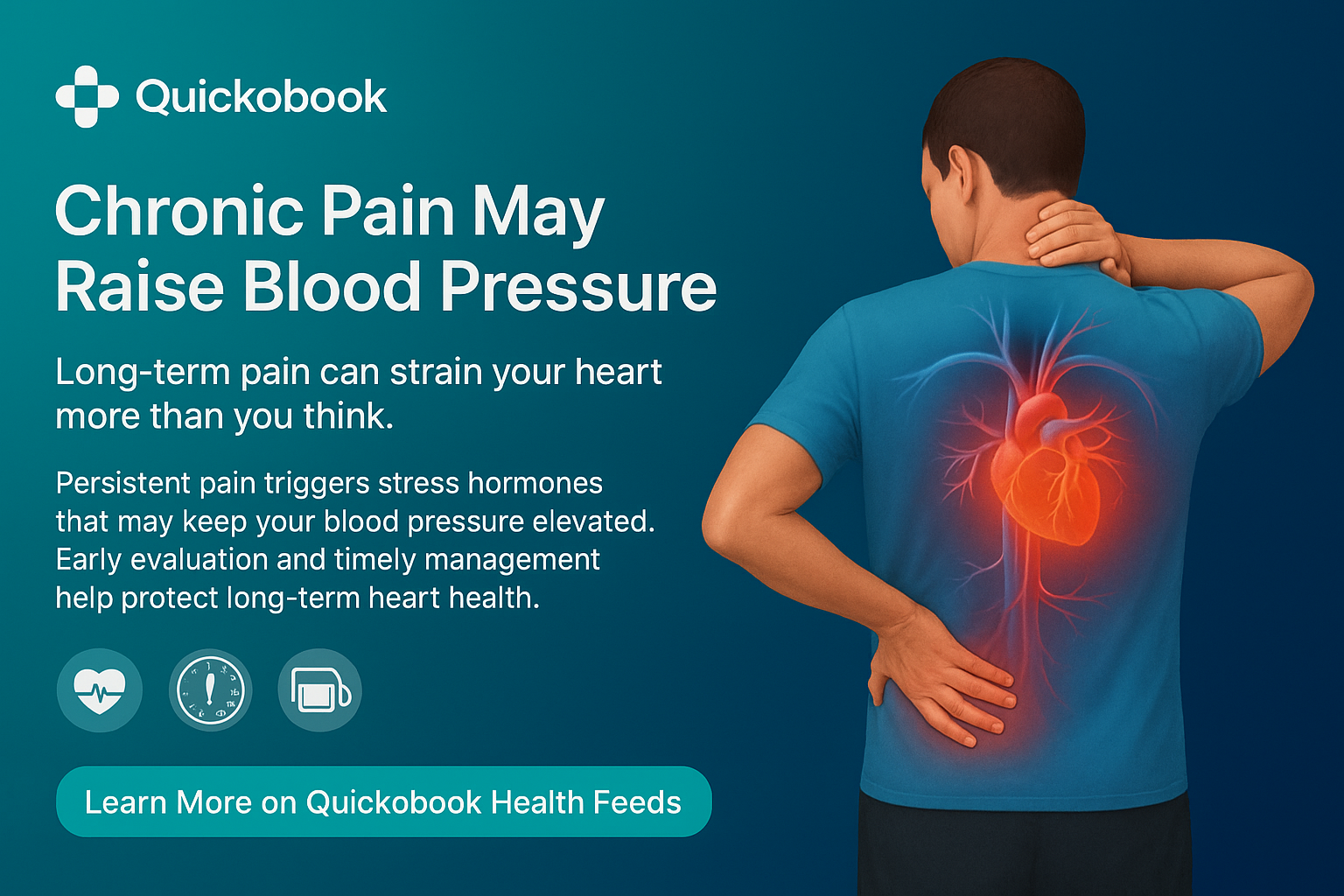







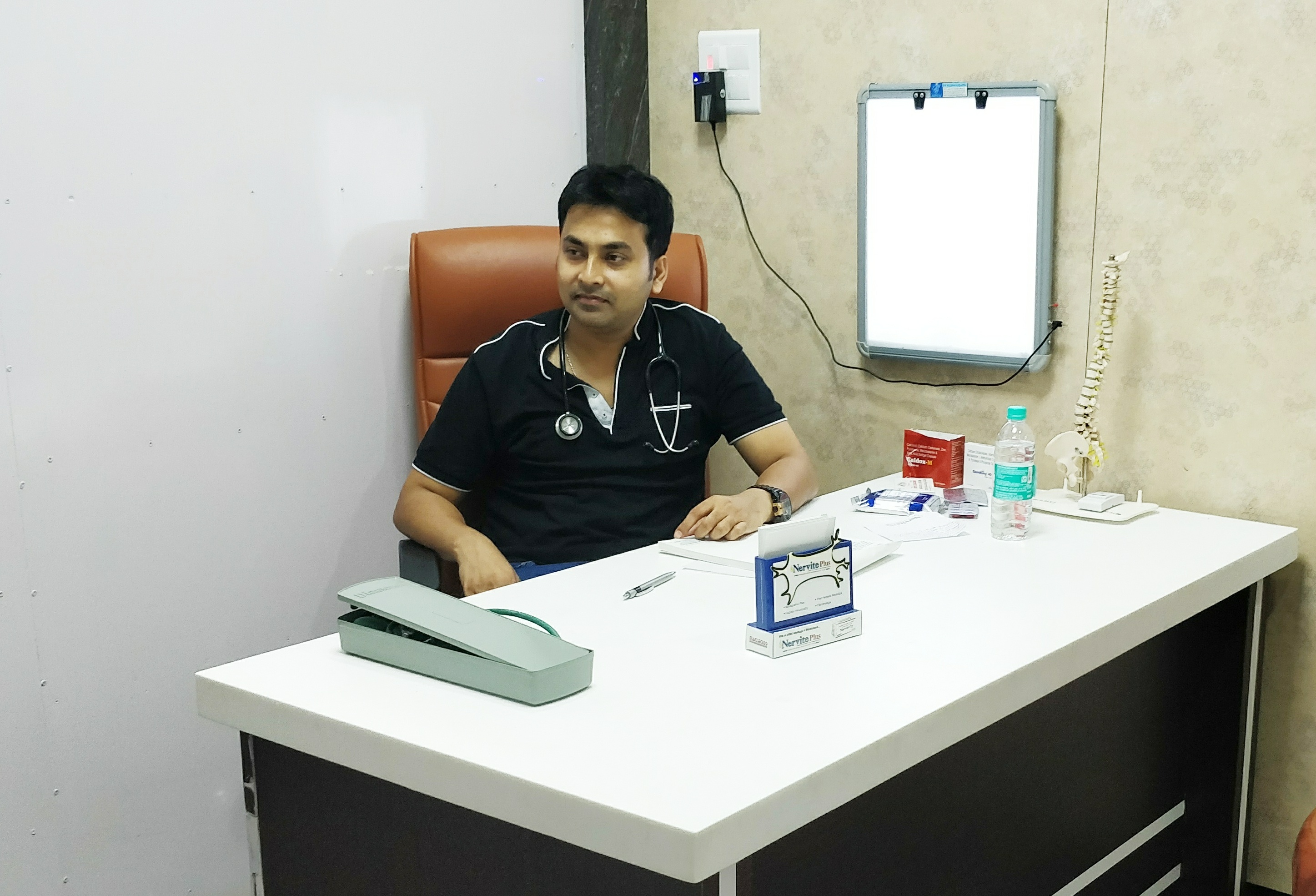



Comments (0)
No comments yet. Be the first to share your thoughts!
Leave a Comment